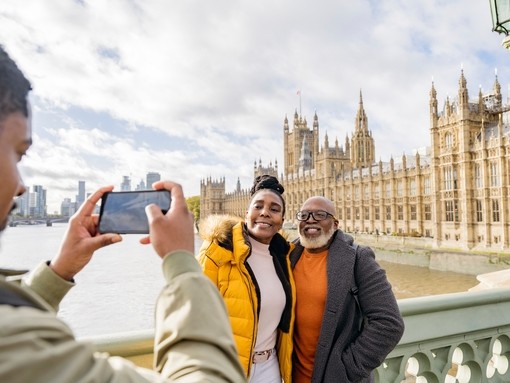Presenting your business or destination to the travel trade
VisitBritain/Getty Images

Introduction
In order to work successfully with the international travel trade, your product must be ‘trade-ready’. This translates into being able to welcome international travellers, offering net or commissionable rates, and providing information on whether you support the fully independent traveller (FIT) or offer group rates.
The travel trade is a complex global network, so first ensure that you are targeting the right people or organisations. Our guide to Understanding the travel trade is a good starting point, and our advice on Making the most of trade shows and missions can help maximise your productivity when meeting face-to-face.
Before you begin presenting your product to the travel trade, it is essential to consolidate your product identity, decide which message you want to convey, and establish exactly what trade partners can book with you.
Educational ‘fam trips’
Educational trips or familiarisation (fam) trips enable domestic and incoming tour operators, travel agents and other members of the travel trade to experience your product first-hand. This type of trip can also be extended to the international press and media.
Whether it’s securing targeted media exposure for your product or promoting your business to the people who’ll ultimately be selling it to consumers, hosting these visits is a valuable way of spreading the word about your business to a global market.
VisitBritain/VisitEngland organises travel trade educational visits linked to our Showcase Britain event, and to coincide with our marketing campaigns. For information on how to take part, please contact your accredited Local Visitor Economy Partnership or Growth Hub, or access support from VisitScotland, Visit Wales or Tourism NI.
Top tips for hosting a successful educational trip
To get the maximum benefit from hosting a fam trip, it is essential to plan ahead:
In the run up
- Research who’ll be attending, where they are from, their company, position, which markets they operate in and whether they sell competitors’ products or complementary products.
- Ensure your staff are well-briefed and aware of the visit. It can be helpful for them to watch our market webinars and training tools.
- Prepare information on your business and product, ideally tailored for each participant – or more broadly bespoke to the market and audience of the buyers or media attending.
During the visit
Offer a warm welcome and a clear agenda.
Show them around your hotel or allow them to experience your attraction first-hand. Tailor this to your audience.
Show them around your hotel or allow them to experience your attraction first-hand. Tailor this to your audience.
Provide information packs for participants and any collateral that might help them learn more about your product after your meeting (digital or printed).
Ask the group to provide feedback on your product and their experience during the fam trip. If you have delivered it in cooperation with VisitBritain, we will do our best to collect feedback on your behalf.
Following up
- Add participants’ contact details to your database. (Ensure you are compliant with the General Data Protection Regulations (GDPR): see the ICO website for details.)
- Send thank you emails, and fulfil any requests for further information.
- Follow up on any sales leads generated by the trip.
- Keep participants up-to-date with any relevant changes to your product.
- Add the relevant contacts to your press release, including the VisitBritain press team.
Making the most of trade shows and missions
Making the most of trade shows and missions
Trade shows, missions and other events are valuable opportunities to meet key industry buyers and media from across the globe. Learn how to maximise your results, build strong relationships and make each event a success with our free guide and checklist.
Trade shows, missions and other events are valuable opportunities to meet key industry buyers and media from across the globe. Learn how to maximise your results, build strong relationships and make each event a success with our free guide and checklist.
Sales calls
Use our check-list for planning your sales calls:
- Try to ensure that you call at a convenient time for your contact, especially if you’re making international calls. Avoid calling during busy holiday times, and be aware of potential clashes with events such as major trade shows.
- Cold calling is rarely appreciated, so plan your sales calls well in advance. Diarise the appointment, and as a courtesy confirm your call before it takes place.
- Carefully consider what form your call should take: on the phone, online conference (with or without video?), or via an app such as FaceTime or WhatsApp. Ensure that the format is clear, that you and the client have any required software and, if applicable, that the meeting link is shared in advance.
- If you set a time to call, ensure that you keep to it.
- Do your homework. If you are well versed about the distributor you’re calling, it makes a good impression. Similarly, have the figures to-hand of your recent and past business with the person you’re calling: this is essential when negotiating for new business.
- Research cultural customs: respecting those small cultural differences can make all the difference.
- Make a written record of everything discussed, and ensure you fulfil your side of the deal. Communicate your agreements after the call to ensure there’s a record, and that you share the same understanding of what you’ve agreed.
- Follow up to the call with clear actions and responsibilities, and set a preferred timeline for future engagement.
Our training and events
Our training and events
Widen your network, sharpen your skills and access new markets with our wide range of events and training for UK businesses. Including the free ‘Taking England to the World’ course, to help you reach new international customers.
Widen your network, sharpen your skills and access new markets with our wide range of events and training for UK businesses. Including the free ‘Taking England to the World’ course, to help you reach new international customers.
Product training
Keep the content as simple and interesting as possible, and communicate all of the key details about your product.
Understand your audience and the information that they require for their jobs. If you fulfil their needs, they’ll be more likely to remember what you tell them.
Let participants know where your product is featured, whether it’s part of a broader campaign, or in a brochure.
Schedule your training for times that are likely to appeal to participants. As with sales calls, avoid national holidays and busy trade events.
Consider the practicalities: ensure you have enough materials for all of the people you’re going to train. That includes biscuits, tea and coffee.
The latest news and opportunities, straight to your inbox
Subscribe to our newsletters
Sign-up for our fortnightly newsletter to receive our latest international market intelligence, partnership marketing opportunities, tourism events and news.
Sign-up for our fortnightly newsletter to receive our latest international market intelligence, partnership marketing opportunities, tourism events and news.











